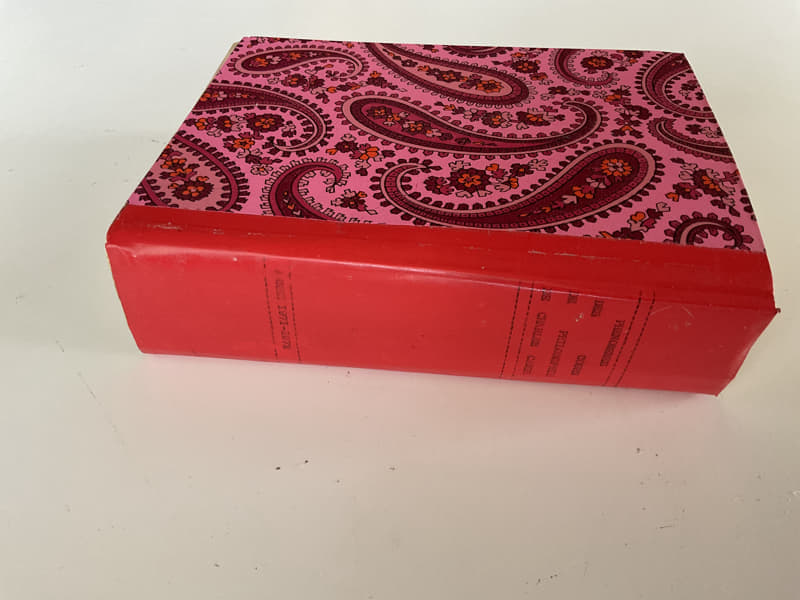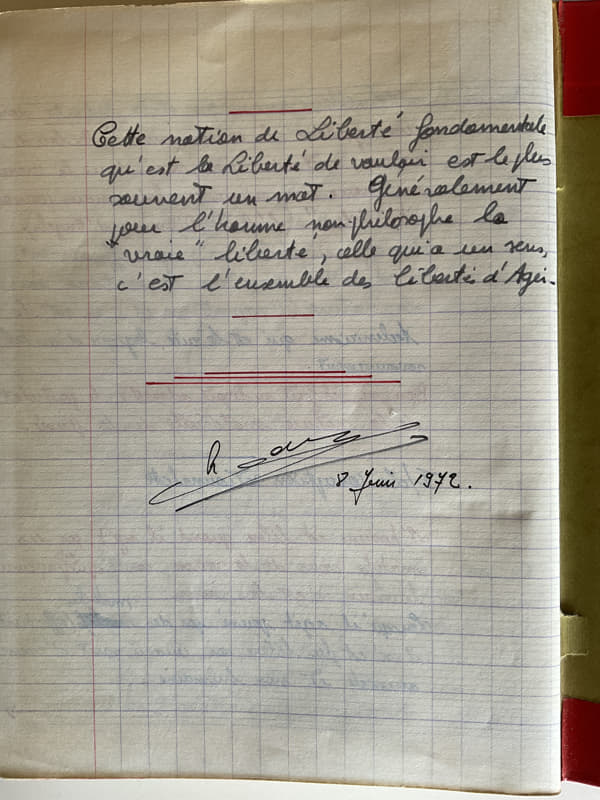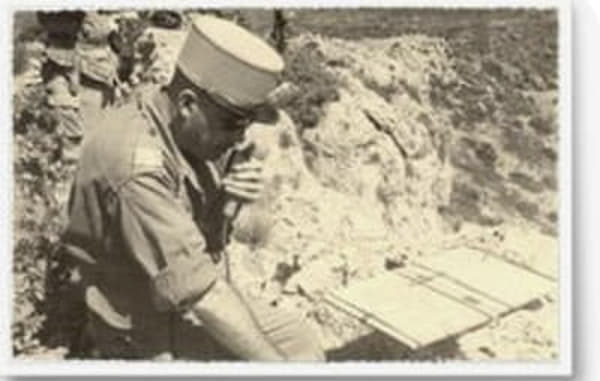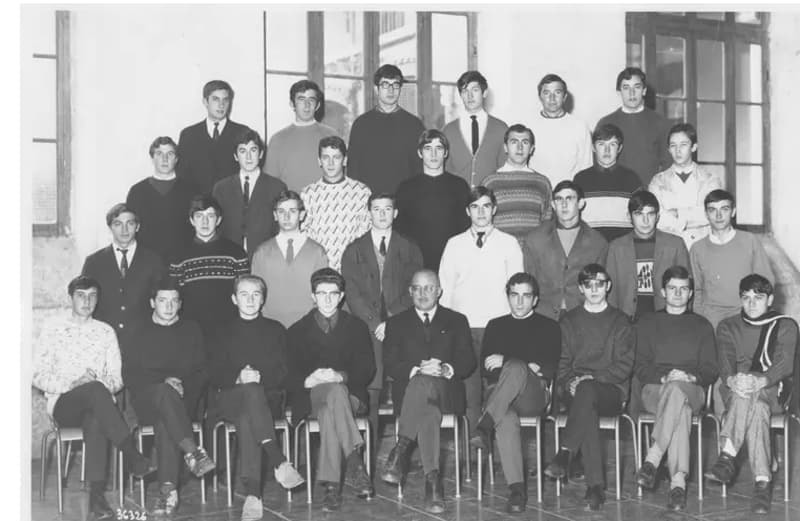There, in front of me, sits a fat folio, made up of four large Clairefontaine notebooks, covers stapled back-to-back. The title, typed on the homemade red plastic binding, evoked the beginnings of an apprentice philosopher discovering the nervous power of words: “Phénomènes des cours de philosophie de Charles Cambe—Année 1971-1972” (“Notes from Charles Cambe’s Philosophy Course—Year 1971-1972). Charles Cambe was my philosophy teacher at Lycée Théophile-Gautier in Tarbes, France. He was a colonel in the Foreign Legion.

Shaven-headed, calm and sharp-tongued, he had a way with the dunces (I was no longer one of them) who frequented the bars in this garrison town, still home to the first and oldest Hussars regiment in Europe: Tarbes is the birthplace of Marshal Foch, Generalissimo of the Great War, and romantic writer Théophile Gautier; poets Comte de Lautréamont and Jules Laforgue sat on the same benches as I did listening to the Colonel. Lourdes is nearby .
The Colonel was sarcastic with the good students in Terminale A1, “la philo 1,” (I was not one of them), whom he knew would stop pretending to think, once they had passed the baccalaureate. He arrived in class, on the day of military ceremonies in front of the 1939-1945 war memorial, engraved with lapidary eloquence—NI HAINE NI OUBLI (Neither Hatred nor Forgetfulness)—wearing his unique and prestigious sand-colored uniform; he placed his glorious white kepi on the desk itself slightly raised on a platform. He looked at us, all boys, called the roll and began in a steady, poised voice, without a trace of picturesque accent, as befits a monk of the one and indivisible Republic, a voice full and frank—”dynamic” would be the right word.
In Terminale A2, the class of the lesser students, the teacher was a late graduate of May 1968, who puffed on his fag, sometimes taught on the paving stones of the school yard, was on first-name terms with his pupils and, if he had had the courage of his “make love not war” convictions, would have made hootchie-kootchie-koo with them and their girlfriends. But it was all a game of appearances, because on the one occasion when our Colonel had to leave to pay tribute to one of his men and raise a glass with the toast, “for the dust,” the A2 hippy took over the legionnaire’s course exactly at the point where the Colonel had dropped his voice to go and deliver his eulogy, and this resumption was seamless. They had divided up the roles. They rode in pairs, like Templars. Never trust appearances or clothing, be it sand or hippy, which does not a philosopher make.
I opened the first notebook and began reading Chapter I (my homemade folio contains 41 chapters), dated September 16, 1971. I had understood immediately that I owed it to philosophy to transcribe the viva voce: “stupid” said the good people in class, but amazed in the divine sense of the word stupor, that impression which strikes the mind in the face of an unheard-of event. I got into the habit of taking notes verbatim and in extenso, a profoundly rhetorical memory technique, I would later learn. It is a habit I have kept, and one that still brings back to me Barthes’s enveloping words, or Levinas’s desultory remarks.
My large folio repeated, without my having guessed it because I was ignorant, the ancient technique of phrase books and books of quotations, sources of invention among the great rhetors, from Antiquity to the Counter-Reformation, and of the transmission of knowledge by word of mouth, since the first mythical act when Apollo, god of speech, spat into the mouth of his first soothsayer.
Here is how my first philosophy class began, when I was sixteen: “Sensitivity. Sensible knowledge is knowledge acquired through the senses. The philosophical attitude consists in stopping in front of facts that are apparently self-evident— to the common man. Sense and organ should not be confused: a sense is the power to experience a certain category of sensations; an organ is a set of ‘terminal’ nerve cells (and here I remember a brief glint from behind his thin gold-rimmed glasses: the colonel loved irony), sensitive to certain phenomena.” That is how, at sixteen, long-haired and a virgin, I entered philosophy. I never left (philosophy, that is). It was love at first sight for the philosophical word, the eloquence of the mind: For a year, Colonel Charles Cambe led me, in 41 stages, along a path of initiation whose great models are, in Antiquity, the Tablet of Cebes and, in the French Classical Age, Desmarets de Saint-Sorlin’s Délices de l’Esprit (Delights of the Spirit), when a master philosophizes and leads a young man from place of intelligence to place of meditation, stimulating the desire to know more by the spur of his words alone, and makes him discover a new wonder of the intellect at every door he passes through, so that when he leaves the halls of knowledge and self-discovery, the young man knows “how to lead his life well.” His eloquence thus led me to perceive what I was destined to become.
It is hard to imagine, now that everything is conspiring to destroy the critical spirit of high school students, now that the cult of the keyword reigns among adults, it is hard to imagine the life lessons those philosophy classes were, those of the Colonel, like those of the hippie of Terminale A2: we were taught to ride restive steeds and wild stallions. Outside, as I write these lines, I hear the sound of their hooves, a horde of horses being brought to the stables of the Imperial Stud, not far from the same high school. Under the influence of this philosophical word, every day, for several hours, at the most exact timing of the morning, when we were awake in the most virginal and seminal state of our sixteen years, the Colonel wanted to turn us into horsemen and stallions.
The course itself was a lesson in the formative power of philosophy, placed at the pinnacle of our education at the very moment when, as the State separated from the Church, ten years before the Great War, the Republic abolished rhetoric and replaced it with philosophy. Simply put, a higher form of eloquence replaced one that had become too literary. How eloquent and handsome our philosophy teachers were! They had donned the mantle of the great preachers, to educate, truly educate, the apprentices of citizenship, and manhood.
I will give you the outline of Colonel Cambe’s course: majestically, making our way to the top of the mountain, as in the Tablet of Cebes, we passed from sensible knowledge to the unconscious, then to memory (ah! the passage on “acted recognition, emotional recognition and thought recognition;” if only one weighed these simple definitions in politics), and to imagination, then to language and signs. Two months passed. Autumn and Advent. Another notebook. In November, as the Pyrenees turned gray and rainy, a notch, a step, a progress to break the melancholy: here, blow by blow, were concept, judgment, reasoning, scientific knowledge, mathematics, experimental sciences, applied mathematics, biological sciences, history and historical becoming (I noted: “a document is either a vestige or a testimony”… yes, as simple as that, but it took him many pages of notes, the Colonel, his kepi on his desk, to make us perceive the value of this distinction), sociological fact and, almost at the top of the mountain, the shining door, the one of pearl and ivory as I think Homer used to say: Truth. I had gone so far as to capitalize it, as we were due to resume classes at Epiphany time.
Until Easter, he spoke to us of habit, will, pleasure and pain, emotion, passion (I read: a passion is either “dominant, or dominating or exclusive”: quite a program!), followed by an almost Barthesian slide, unexpected from a legionnaire, on “the life of a passion.” The Terminale A1, when the chestnut trees were greening up, listened to Colonel Cambe discuss morality, duty, responsibility and sanctions, followed by the ancient schools of morality, Kant, utilitarianism and “the philosophers of life,” followed by Nietzsche: ” You shall not beget!” “What is great about a man is that he is a bridge and not an arrival point.” “To be a man is to overcome.” Finally, Bergson, Sartre and Marx: “To re-establish the DIGNITY of man is to destroy the alienation of labor”—here, I dared to capitalize a whole word, because the Colonel had to take off his gold-rimmed glasses, put them on the table, and accentuated the term.
Then, as the end of classes approached, and Pentecost too, came three surprises, for after a year of daily attendance, we had all formed an idea of who was the Colonel-Philosopher. False ideas: the dunces assured us they had seen him at the brothel. The good ones said he never smoked (astonishing in those days). Others spoke in hushed tones about his wife (one of those Dominique Sanda-like beauties from the colonies, whom I only met once). He threw three quick, luminous lessons in our faces, like the gauntlet of an old-fashioned challenge, because by then we were seasoned and he thought we were ready to go at full throttle.
First, two lessons on beauty and God. Him—talking to us about beauty and God? We had to be thrown off our guard. On beauty, I noted: “Beautiful comes from bellus, diminutive of bonus. Bellus is a colloquial term and was used to refer to women and children, while “lovely,” addressed to a man, was very, very pejorative, if you know what I mean; for a man, the word was pulcher.” The Colonel, having brightened us up, then moved on to serious matters, point by point, and having lifted our souls to the aesthetic, he would, systematically, as if maneuvering—we were at Pentecost after all—put before our minds’ eyes all the proofs of God’s existence, deployed a priori and a posteriori.
Face to face, on the chessboard of life that opened up before us, here was the strongest dilemma facing a man who had to “overcome” himself, and achieve true pulchritude: by the senses, or by transcendence? As if to say: everything I have taught you is now to be tested against this double possibility. Weigh it up! Think! Because to “overcome” is to be free. And guess what his farewell lesson to arms was, the last surprise of the legionnaire-philosopher, finger on the seam of his pants? Freedom. “You are free to judge.” A fine piece of work!
I remember visiting him at home twice. The first was before the baccalaureate exams. I asked him to sign my big handmade tome. He signed it, on June 8, 1972, without saying a word. He only asked me how my father was. I saw him a second time, when I entered the rue d’Ulm (the École normale supérieure), in July 1975. I went to thank him for having taught me, confessing to him that, often, at Louis-le-Grand, I would reopen my big notebook to find the right path, rectitude, even the joy of thinking. He said to me: “Salazar, you should have gone to Saint-Cyr” (the foremost military academy of France).

Charles Cambe, colonel, legionnaire, philosopher, died in July 2005. The 2006 class of the Special Reserve General Staff School (ESORSEM), at the French War College, bears his name. As long as the Republic (not this republic, a mere ghost) keeps up with these teachers, even the hippy of Terminale A2, and keeps up with this teaching, this eloquence, the Republic will have “values.” Where is the source of the Republic’s crisis and decline? As we have seen, the republican school calendar silently follows the liturgical calendar. Old habits die hard. The Republic is sometimes capable of overcoming herself, and now and, then, even reach pulchritude.
The last word, I hand over to the colonel, and this is the last sentence in my big notebook: “This notion of fundamental freedom that is the freedom to will is most often just a word. Generally speaking, for the non-philosophers, their idea of ‘real’ freedom, the freedom that makes sense to them, is just their freedom to act as they please.” Has the Republic become just that: a sum of freedoms to act, with its strident claim to be the only valid “ethics,” from head of state down to ordinary citizen? When shall we finally “overcome” ourselves?

French philosopher and essayist Philippe-Joseph Salazar writes on rhetoric as philosophy of power. Laureate of the Prix Bristol des Lumières in 2015 for his book on jihad (translated as, Words are Weapons. Inside ISIS’s Rhetoric of Terror, Yale UP). In 2022, the international community of rhetoricians honoured him with a Festschrift, The Incomprehensible: The Critical Rhetoric of Philippe-Joseph Salazar. He holds a Distinguished Professorship in Rhetoric and Humane Letters in the Law Faculty of the University of Cape Town, South Africa.
